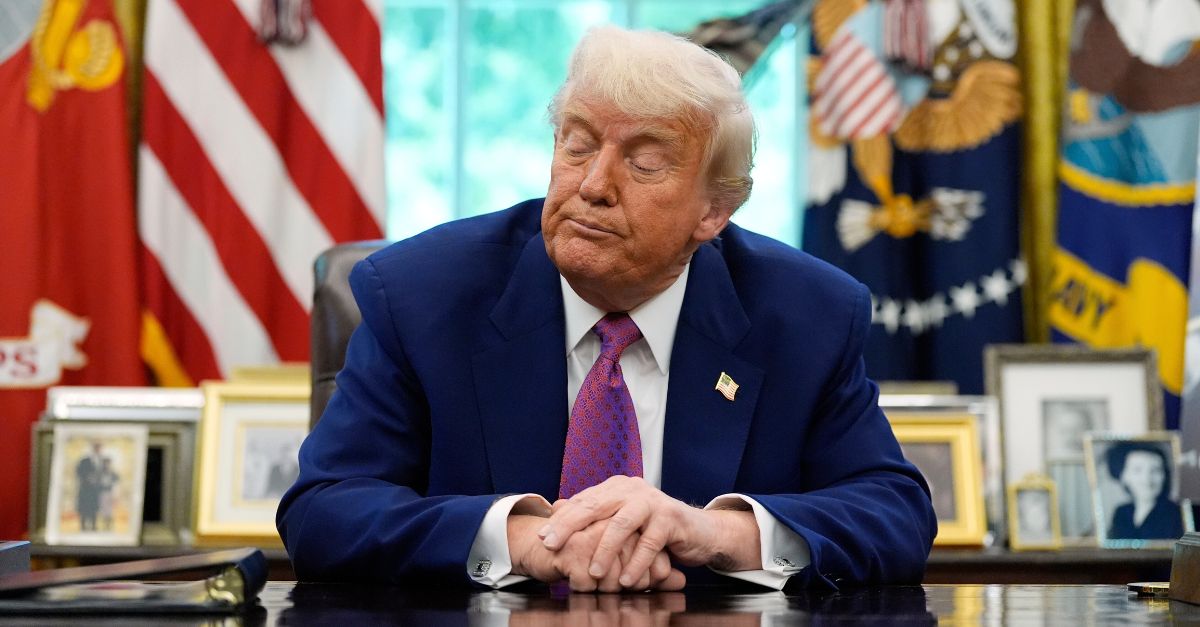
President Donald Trump pauses as he speaks in the Oval Office of the White House, Tuesday, May 20, 2025, in Washington (AP Photo/Alex Brandon).
A federal court in Washington, D.C., on Tuesday ordered the Trump administration to continue providing gender-affirming health care to transgender inmates in the custody of the Bureau of Prisons (BOP).
In a 36-page memorandum opinion, U.S. District Judge Royce C. Lamberth, a Ronald Reagan appointee, issued a preliminary injunction barring a suite of government policies purporting to ban such care.
The court’s order will remain in effect until the case concludes at the district court level or is stayed by an intervening court.
“During the pendency of this litigation, the BOP is required to restore and maintain access to those treatment modalities for those who previously received them pursuant to a prescription rendered by BOP staff,” the opinion reads. “And moreover, if BOP medical personnel subsequently determine that an existing or future class member is in need of either or both of these treatment modalities, the BOP may not take those treatment options off the table while this dispute is pending.”
Love true crime? Sign up for our newsletter, The Law&Crime Docket, to get the latest real-life crime stories delivered right to your inbox.
On Jan. 20, President Donald Trump issued Executive Order 14168, entitled “Defending Women From Gender Ideology Extremism and Restoring Biological Truth to the Federal Government,” which directed agencies to “end” federal funding of so-called “gender ideology.”
Relevant to the present litigation, Trump’s plans mandated a categorical ban on using federal funds “for any medical procedure, treatment, or drug for the purpose of conforming an inmate’s appearance to that of the opposite sex.” In turn, on Feb. 21, and Feb. 28, the BOP issued two implementing memos barring the use of federal funds for “any items that align with transgender ideology (e.g., binders, stand-to-pee devices, hair removal devices, etc.)” and “any medical procedure, treatment, or drug for the purpose of conforming an inmate’s appearance to that of the opposite sex,” respectively.
Lamberth’s order pumps the brakes on these policies.
The judge found the plaintiffs were likely to succeed on their claim that the BOP memos were arbitrary and capricious under the Administrative Procedure Act (APA) — the federal statute governing administrative agencies and litigation against agency actions.
“The BOP’s implementing memoranda fall short,” the judge observes. “The BOP’s only explanation for its new policies is that the Executive Order required the adoption of those policies, and that the Executive Order itself provided adequate explanations for BOP’s new policies.”
Lamberth reasons that if any agency could justify its actions “simply by gesturing to” an executive order, the president “could unilaterally eviscerate the judicial oversight that Congress contemplated in passing the APA simply by issuing a carbon-copy executive order mandating that an agency act in a particular way before it does so.”
The judge also took stock of what the executive order says and applied it to the facts of the case — essentially a merits analysis.
From the opinion, at length:
[E]ven taking the Executive Order’s rationale at face value, it has little, if anything, to do with the agency’s decision to discontinue inmates’ gender-affirming care. By taking hormone medications and accessing social accommodations, the plaintiffs do not seem interested in propagating any particular “ideology”; to the contrary, their sworn declarations make clear that they are taking these measures to lessen the personal anguish caused by their gender dysphoria, a benefit on which they have relied for years under the BOP’s longstanding policy of providing this type of care. In light of the plaintiffs’ largely personal motives for undergoing gender-affirming care, neither the BOP nor the Executive Order provides any serious explanation as to why the treatment modalities covered by the Executive Order or implementing memoranda should be handled differently than any other mental health intervention.
“Nor does the Executive Order make any effort whatsoever to explain how providing hormone medications or social accommodations to prisoners hampers ‘scientific inquiry, public safety, morale, trust in government,’ or any other virtue animating the Executive Order,” Lamberth continues. “And nothing in the thin record before the Court suggests that either the BOP or the President consciously took stock of — much less studied — the potentially debilitating effects that the new policies could have on transgender inmates before the implementing memoranda came into force.”
The plaintiffs in the case are three inmates, led by Alishea Kingdom, who filed a 37-page complaint on March 7 in response to various ways in which BOP officials sought to deny them gender-affirming care.
The lead plaintiff was told her hormone therapy would stop, and it was only restarted after she initiated the litigation. Another plaintiff had his hormone therapy stopped, and access to social accommodations was halted before it was temporarily resumed in response to another lawsuit. The plaintiff was told it would stop again when the restraining order in that other case ran out. The third plaintiff was told his hormone therapy would be stopped after his current prescription expires.
The court says its intervention is necessary, despite arguments from government lawyers that each plaintiff still received their hormone therapy drugs. The judge rejected this state of affairs as both “tenuous” and improperly premised on “vagaries and vicissitudes.”
“[I]t seems probable that without an order to the contrary, these plaintiffs will lose access to their medicine,” the opinion continues. “Though the BOP represents that more than 600 other inmates with gender dysphoria are receiving hormone treatments, it has given no affirmation that these treatments would be likely to continue in the absence of judicial intervention. Circumstantial evidence suggests otherwise.”
The judge described the plaintiff’s harms as potential and likely, in terms of access to hormone therapy, and manifest, in terms of their “uncontested” lost access to social accommodations. Such harms, the court says, are “severe.”
“[G]ender dysphoria can produce severe side effects ranging from depression and anxiety to suicidal ideation and self-harm if inadequately treated,” the judge notes. “The BOP does not dispute this medical reality.”
In the order, Lamberth certified the plaintiffs as a class, allowing them to represent other “BOP inmates diagnosed with gender dysphoria” who stand to have their therapy or social accommodation access limited by Trump’s policies.
“[I]t is virtually certain that at least some other current and future gender dysphoric inmates need or will need it as well, and even that some gender dysphoric inmates who do not presently need it will need it in the future,” the judge continues. “The Court can reasonably infer that at least some gender dysphoric inmates would be immediately and irreparably harmed by a return to the BOP’s policies in effect as of the initiation of this action, an outcome that seems likely without preliminary judicial intervention.”
Later, Lamberth helpfully summarizes his order:
The import of the Opinion is essentially this: Under the APA, the BOP may not arbitrarily deprive inmates of medications or other lifestyle accommodations that its own medical staff have deemed to be medically appropriate without considering the implications of that decision. Even if the BOP did support such a decision with the consideration, study, and reasoning that the APA requires of it, its freedom of action may nevertheless be constrained by the Eighth Amendment of the Constitution, but that is a matter better left for another day — whether that be a later stage of litigation, or another case entirely.



